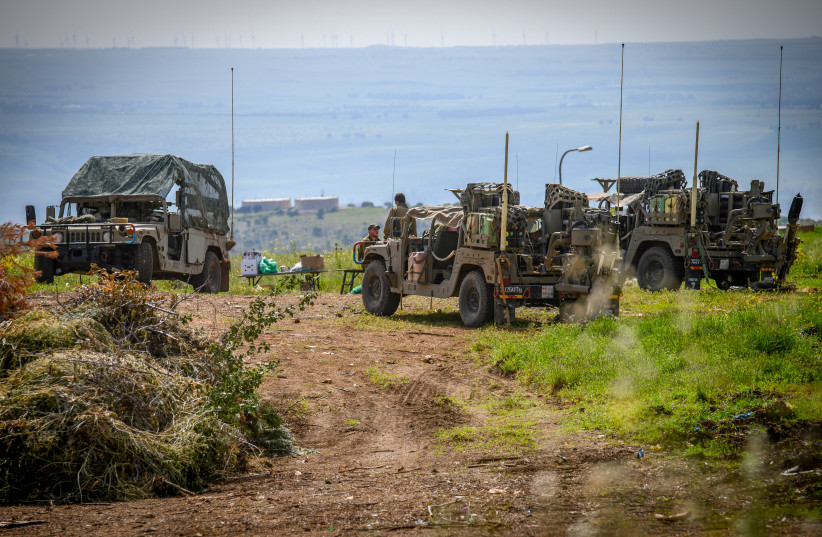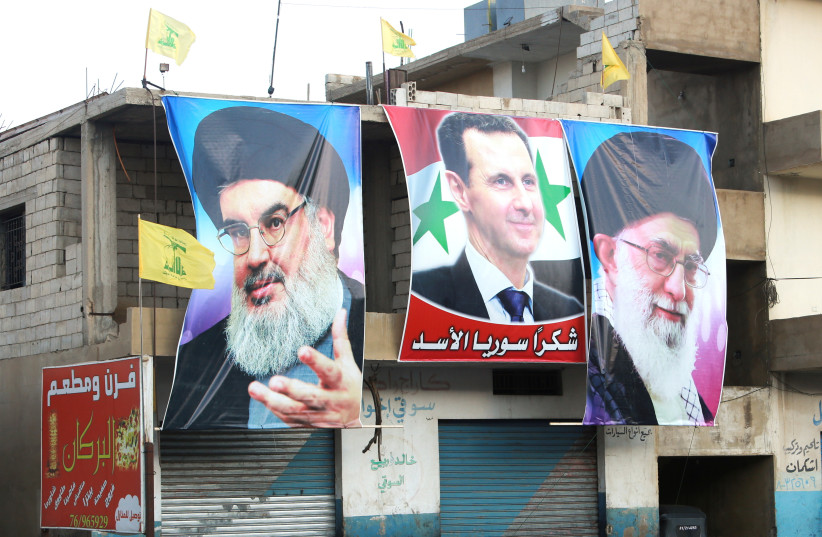JONATHAN S. TOBIN
The biased reactions of U.N. officials and corporate media to attacks on Israelis as well as to disputes over Jerusalem’s Temple Mount are rooted in leftist lies about Zionism.
.
 Press briefing by Francesca Albanese, special rapporteur on the situation of human rights in the occupied Palestinian Territories at the United Nations in New York City, Oct. 27, 2022. Credit: Lev Radin/Shutterstock.
Press briefing by Francesca Albanese, special rapporteur on the situation of human rights in the occupied Palestinian Territories at the United Nations in New York City, Oct. 27, 2022. Credit: Lev Radin/Shutterstock.
Anger at the U.N.’s “Special Rapporteur for the Palestinian Territories” Francesca Albanese for her outrageous slanders of Israel is more than justified. So is frustration and outrage about biased coverage of the Middle East in leading corporate media outlets like CNN and The New York Times of a string of deadly Palestinian terror attacks as well as recent events on Jerusalem’s Temple Mount.
The never-ending series of egregious comments from Albanese provides plenty of fodder for critics of the United Nations and the international “human rights” community. Similarly, news reports that treat terrorist attacks on Jews with indifference while hyping the shootings of Palestinian terror suspects by the Israel Defense Forces or even attempts to restore order on the Temple Mount after the mosques there were commandeered by rioters into grave violations of human rights are flagged by the vital groups that monitor anti-Israel media bias.
These awful examples of how both international groups and the media misreport and falsely characterize events in Israel are, by themselves, important and deserve vigorous pushback. But such statements and media coverage that might well be termed more a form of disinformation or propaganda than journalism are just the tip of the iceberg that those who care about the campaign against Israel must confront. And, as important, even essential, as it is to call out each and every such instance of lies and prejudice may be, the confluence of so many egregious incidents should serve as a reminder that the problem goes much deeper.
The bile and lies tweeted by Albanese as well as most of the media coverage of what’s been happening on the Temple Mount as well as in attacks, such as the tragic slaying of 48-year-old Lucy Dee and her daughters Maia, 20, and Rina, 15, when Palestinian terrorist fired on their car, is infuriating. But it’s not merely the product of indifference to Jewish suffering and rights or even antisemitism, though all of it can be easily observed in such cases.
Still, these are symptoms, rather than the root cause, that explains the problem on display throughout so much of the discussion about Israel and its conflict with the Palestinians. The real complexity isn’t bias, ignorance or even the Jew-hatred that is not far below the surface of the critiques of the Jewish state. The issue isn’t so much prejudice as it is the widespread acceptance of the concept that Israel “occupies” Palestinian territories.
t is the willingness of both neutral observers and even many who claim to support Israel to believe that the relationship between the Jews and the territory in question is one of “occupation” that drives the negative appraisals of Israel’s conduct. It is the endless talk of this concept that explains attitudes towards the Palestinians and the so-called “solutions”—whether of the two-state or one-state variety—to the century-old jihad against Zionism in the media. It’s the belief that the occupation must be eliminated that also motivates the stands of foes of Israel among multilateral institutions like the United Nations as well as the increasingly influential intersectional left-wing of the Democratic Party. But it also is essential to understanding why the Biden administration and liberal Jewish groups believe that Israel must be saved from itself in order to survive as a Jewish state.
The lie about ‘stolen property’
Put simply, as long as Israel is viewed as in possession of territory that belongs to someone else, whether in Judea and Samaria—or even in Jerusalem and pre-1967 Israel inside the old “Green Line”—the slanders and the media bias will continue.
The argument openly expressed by the likes of Albanese and reflected in the coverage of CNN and the Times, is simple. It views Israel as illegally “occupying” Judea, Samaria and much of Jerusalem since the Six-Day War in June 1967. It regards anything that impedes the surrender of this territory by Israel—something that includes both the creation of Jewish communities there or efforts by the IDF to root out Palestinian terrorism—as an “obstacle to peace.”
Albanese, like the Palestinians and the anti-Zionist left both here in the United States and around the world, define the occupation differently. They see the presence of a Jewish state anywhere in the country as also being an “occupation.” And that is a definition widely accepted around the world. In that sense, every Israeli Jew, even the most liberal opponents of settlements who sympathize with the plight of the Palestinians, is as guilty of being an occupier as the residents of West Bank settlements.
Of course, liberal critics of Israel don’t accept that. They believe that Israel within the “Green Line” is legitimate while Jews who live on the other side are not.
The problem with that way of thinking is that once you concede that any part of the country that constitutes the ancient homeland of the Jewish people—to which it has rights rooted in history and international law—as off-limits to Israelis and Zionists, you make peace less, rather than more likely.
To state this is not to deny that the Palestinian Arabs, as they now conceive of themselves, have become a separate nationality over the course of the last 100 years, even if that was not the case prior to the early 20th century. At various points over the course of those 10 decades, the Jews have agreed to compromise plans by which the Arabs would have sovereignty in part of the country in exchange for their recognition of a Jewish state in the rest of it. But each time, including repeatedly in the last 30 years since the Oslo Accords of 1993, they have refused any deal that would end the conflict because it would involve them accepting the legitimacy of a Jewish state, no matter where its borders would be drawn.
That refusal is not so much (as well-meaning international observers and multiple American presidents have thought) the product of a misunderstanding or a real estate transaction in which the two sides refuse to compromise. Since the rejection of Zionism is an inextricable element of the Palestinian national identity that came into existence during this conflict, no Palestinian leader, no matter how much both Americans and Israelis want to think of them as “moderates,” can accept any such compromise.
More to the point, the intersectional left, which conceives of the Palestinian war on Israel as morally equivalent to the struggle for civil rights in the United States sees Zionism on both sides of the green line in the same way. If you divide the world, as believers in intersectionality and critical race theory do, into two groups—oppressors and victims—and assign victim status to the Palestinians and treat Israelis as colonizers, then it doesn’t matter how badly the former behave, the latter is always in the wrong.
That’s why U.N. functionaries like Albanese who masquerade as human-rights activists are able to treat crimes against humanity, like the slaughter of the Dee family as justified “resistance” to “occupation.” In the same way, efforts by the IDF to stop terrorists or even to maintain order on the Temple Mount—the most sacred spot in Judaism—as similar acts of “occupation” that should be condemned.
Misguided pro-Israel advocacy
Sadly, much of the efforts by the State of Israel and of those groups who are tasked with defending it in the United States, are compromised by their willingness to give some legitimacy to the occupation narrative, even as they strive for fair treatment for the Jewish state. All too many of Israel’s supporters treat the question of occupation with a “yes, but” approach in which they concede that Israel doesn’t have full rights—which, at least in theory, could still be negotiated away in exchange for real peace—to the territories. That was the conceit of the disastrous Oslo Accords, which sought to trade “land for peace” with the Palestinian Liberation Organization. Yet in addition to a transaction that would end up being an exchange of land for more terror, the concessions also legitimized the notion that Jews had no right to be in Judea and Samaria. Rather than, as the Israeli architects of the proposals foolishly thought, illustrate Israel’s love for peace and willingness to compromise, it merely convinced much of the world that the Jewish state was a thief that was reluctantly returning some of the property it had stolen.
Regardless of their political affiliations or sympathies, those who care about Israel need to understand that they cannot avoid confronting the occupation lie. It cannot be evaded by “rebranding” Israel as a source of beautiful scenery or scientific innovation as some have foolishly thought. Nor can it be sidestepped by constant talk of Israel’s willingness to accept a two-state solution that the other side doesn’t want.
If you want to call out the likes of Albanese or those in the media that lie about Israel, by all means do so. Such efforts are both necessary and important to chip away at the anti-Zionist canards that have gained widespread acceptance. But any argument that fails to correct the misconception about occupation is bound to fail with consequences that go beyond our frustration about the United Nations and media bias.
Jonathan S. Tobin is editor-in-chief of JNS (Jewish News Syndicate). Follow him on Twitter at: @jonathans_tobin.
David Bern
Demand the removal of antisemitic and racist Francesa Albanese
.

Francesca Albanese, an Italian lawyer who was appointed as the “UN Special Rapporteur on the Situation of Human Rights in the Palestinian Territories” has made antisemitic and strongly anti-Israel remarks in the past and is clearly not impartial. Furthermore, her husband previously worked for the Palestinian Authority.
She is appropriately referred to the NGO Monitor as the “Special Rapporteur to Demonize Israel.” Francesca Albanese has demonized the Jewish people and the state of Israel by using antisemitic tropes and borderline antisemitic and certainly hateful images. Her social media feeds are full of one sided content promoting people such as Mohammed El Kurd, a well known instigator of violence. In another post, in 2014, she accuses the Jewish Lobby of controlling the US. Moreover, she has often referred to Terror Operatives as “Human Rights Defenders” on social media.
Her prejudice and prior positions create a conflict of interest, rendering her unsuitable for her United Nations position.
Sign this petition and demand that the United Nations remove Albanese from her post and replace her with an unbiased individual!
You can find more information here, about why Francesca Albanese is unfit for this role:
4. Międzynarodowy Festiwal Filmowy o Totalitaryzmach „Echa Katynia”
 4. Międzynarodowy Festiwal Filmowy o Totalitaryzmach „Echa Katynia” od 13 kwietnia w Warszawie
4. Międzynarodowy Festiwal Filmowy o Totalitaryzmach „Echa Katynia” od 13 kwietnia w Warszawie








